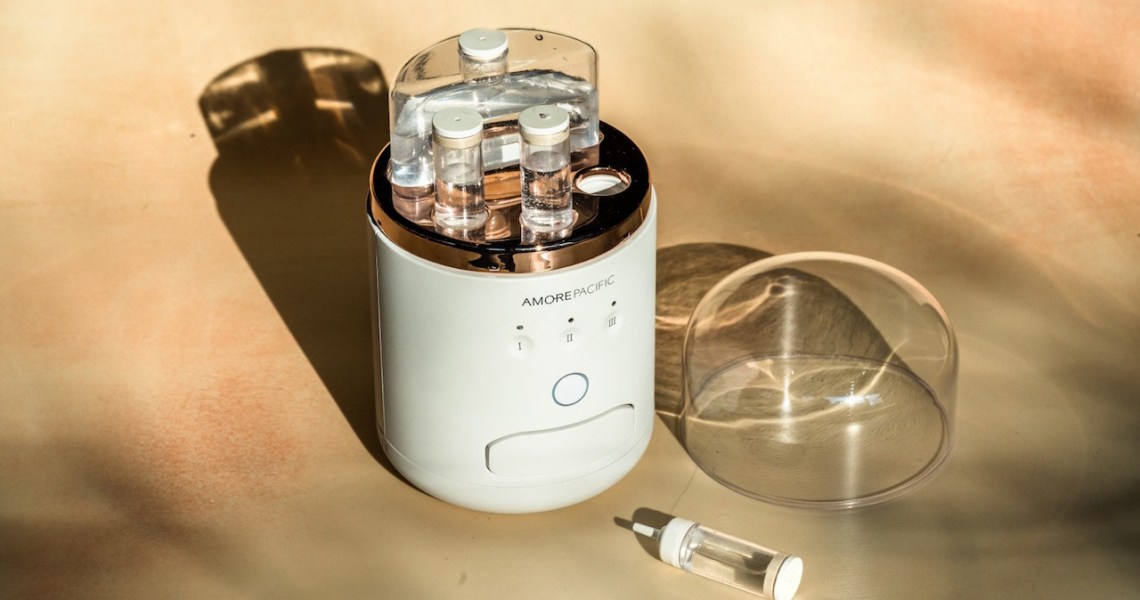Customized beauty and AR try-on were hot topics at CES this year as beauty continues to make its mark on the annual event.
Held from January 11-14, the first virtual version of the Consumer Technology Association’s annual event attracted companies from large conglomerates to startups that highlighted their futuristic innovations in beauty tech. Technologies this year built upon those emphasized in 2020, and have been accelerated by demand for digital solutions to challenges created by the pandemic.
The trend of customized beauty continued this year at CES, with YSL Beauty and Amorepacific showcasing beauty appliances. These companies joined other startups such as Réduit One, which was created by the founder of Foreo and announced at CES last year, and Opulus, which was launched by the founder of Clarisonic in July 2020.
Amorepacific highlighted its custom beauty technology in two products: its Color Tailor custom lip color manufacturing system and its Formularity at-home toner mixing appliance.
While customized devices have historically been in the skin-care arena, Amorepacific appears to be bullish on color cosmetics with its Color Tailor system. This is in spite of the ongoing downtrend of the makeup segment.
The Lip Factory by Color Tailor machine was launched last August at the company’s Amore Seongsu flagship store in Seoul. There, shoppers can purchase a custom lipstick by first taking a quiz via a provided tablet, answering questions such as what facial feature they want to highlight, what texture they prefer and what lip products they use normally. The machine will then mix one of 2,000 custom shades on the spot, which customers can purchase for around $20. According to Dr. Aiden Park, the vp of basic research and innovation at Amorepacific, the technology will be used across multiple Amorepacific brands. No specific brands were named, but well-known brands in the portfolio offering lip color include Etude House, Sulwhasoo, Innisfree and Laneige.

Ad position: web_incontent_pos1
The company’s Formularity device, meanwhile, allows consumers to mix toners at home. Users customize their type of toner by skin concern via one base toner and three ampoules, and the finished product is deposited on a cotton pad.
“We found that customers are reaching for smaller, more convenient alternatives to the full face masks that K-beauty is known for,” said Park.
“Custom beauty is still an emerging market, but we expect consumer preference for products that are specialized for individual skin conditions and personal beauty routines will continue to rise,” said Park. “Many beauty companies see high potential for custom beauty devices in home, and I think the key is fine-tuning the advanced ICT technology and its online platform, so that the focus is on nurturing the ‘connectivity’ with customers.”
Hong Kong-based custom drink-maker startup Lify Wellness also touted beauty benefits, showing its digitally connected herbal drink brewer that offers beauty-focused ingredients such as collagen.
“With beauty businesses remaining closed due to the pandemic, stay-home DIY wellness solutions are becoming more important than ever,” said Adrian Ng, the company’s chief revenue officer.
Ad position: web_incontent_pos2
Several AR makeup try-on and skin-care analysis companies also presented their latest technologies. Perfect Corp, which just inked deals with Snapchat and Google in December, showcased several new features. These included advancements in the accuracy of its AR makeup try-on and skin analysis, AR livestreaming that has been used by clients like Ulta, AR 1-on-1 consultations and a facial aging simulator.
The AR livestreaming and 1-on-1 consultations can be embedded into brands’ websites. According to Adam Gam, U.S. CMO of Perfect Corp, the DTC site “is where things are going, from a trending perspective,” when it comes to brands’ adoption of the technologies. “Social media is great, but when you’re on social media, you’re competing with everything else in that environment,” he said.
Gam noted that the pandemic has “accelerated” adoption of virtual try-on technologies, thanks to the fall of product testers, leading to a 32% increase in use of makeup try-on in the company’s YouCam app. As skin care has become a more popular category during the pandemic, interest in digital skin analysis is also growing.

“More people know Perfect Corp because of color cosmetics,” said Gam, but he said skin care is one of the most-requested new services.
Other companies rolled out AR magic mirror tech for in-store and at home. HiMirror, for example, released a series of smart mirrors with AR try-on technologies and a connection to Amazon’s Alexa, allowing users to purchase products directly off Amazon. Samsung spinoff Lululab, meanwhile, unveiled an AI skin-care “assistant” mirror for stores, allowing users to receive product recommendations based on analysis of their skin.




